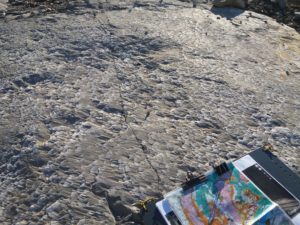Earth, Water and Environmental Sciences (STEE) pathway
Contact
- Training coordinators:Christelle GUILHE-BATIOT and Benoit GIBERT
- Secretary: Rémi MARTIN
course objectives
The Earth, Water and Environmental Sciences (STEE) pathway combines the naturalistic and quantitative approaches of the Earth and Water Sciences. Field training is an omnipresent aspect of the pedagogy. It follows on from previous bachelor's degree courses in these fields, whose titles have varied.
The classic geoscience disciplines (petrology, sedimentology, geophysics, geochemistry, tectonics, hydrogeology, etc.) are at the heart of the course. These disciplines are explicitly geared towards environmental issues (resources, risks, paleoenvironments, global change, pollution, hazards). The acquisition of computer, mathematical, geophysical and geochemical tools is also an important part of our training.
In L3 STEE, a TU project enables students to apply their knowledge and skills through a personal project supervised by teacher-researchers and researchers from the research laboratories associated with the TEE degree.
FURTHER STUDIES AND CAREER OPPORTUNITIES
The STEE pathway is a general one, with the aim of pursuing a Master's degree. It does not, as a matter of principle, direct students towards professional outlets at the end of L3, but a re-orientation towards a professional L3 is possible. Natural career prospects are at Master's level (bac+5) or doctorate level (bac+8). Master's degrees available after the TEE Bachelor's degree in Earth and Environmental Sciences include Earth Sciences, Water Sciences, as well as Environmental Sciences, Energy and Master's degrees with specializations in paleontology, oceanography, etc.
At Master's level, natural career opportunities are at executive/engineer level in large companies, consultancies and local authorities involved in the management of water resources and pollution, natural hazards, mineral and petroleum resources.
PROGRAM
The Earth, Water and Environmental Sciences course is divided into 6 semesters, each comprising TU (Teaching Units), which are validated by ECTS credits. One semester corresponds to 30 ECTS. One ECTS corresponds to 9 hours of student presence in class or in the field, and on average just as much personal work. Throughout the three-year Bachelor's program, there are numerous gateways to and from other Bachelor's courses and other curricula (IUT, BTS, CPGE, engineering schools, etc.).
Here are the TU courses on offer.
SEMESTER 3

- Sedimentary geology, tectonics and cartography (4 ECTS)
- Minerals and rocks (5ECTS)
- Structural geology (2ECTS)
- Seismology and data processing (5 ECTS)
- Hydrogeology (5 ECTS)
- Mathematics for TEE (5ECTS)
- General culture (2 ECTS)
- English (2 ECTS)
SEMESTER 4
- Field internship (Alpes) (5 ECTS)
- Cartography (4 ECTS)
- Geology of France (4 ECTS)
- Geochemistry (5 ECTS)
- Environmental chemistry (5 ECTS)
- Ocean Atmosphere Hydrosphere (5 ECTS)
- English
- Hydraulics (4+1 ECTS) to replaceTU Geochemistry for students wishing to enter L3 GPTP
SEMESTER 5
- TEE 1 project (3 ECTS)
- Deep field internship (3 ECTS)
- Endogenous petrology (3 ECTS)
- Major tectonic systems (3 ECTS)
- Sedimentary rocks and surface transfers (4 ECTS)
- Physics of the Earth (6 ECTS)
- Mineral resources (3 ECTS)
- One option from among : Soil science and pedology and Paleoenvironment (3 ECTS)
- English (2 ECTS)
SEMESTER 6
- TEE 2 project (2 ECTS)
- Field placement (8 ECTS)
- Geodynamics (4 ECTS)
- Geomorphology (4 ECTS)
- Resources, fluids, reservoirs (4 ECTS)
- One TU to choose from:
- Water-Environment: hydrology and hydraulics (8 ECTS)
- Earth-Environment (8 ECTS)